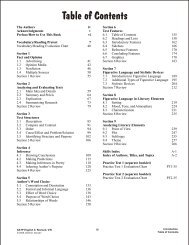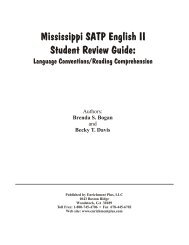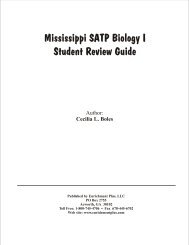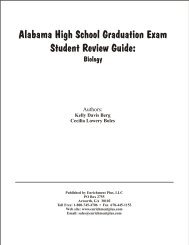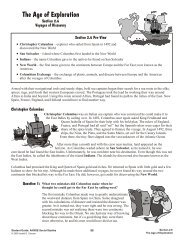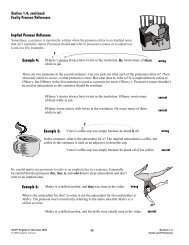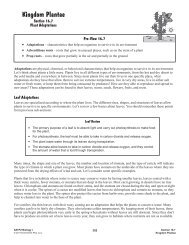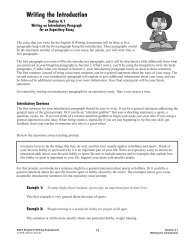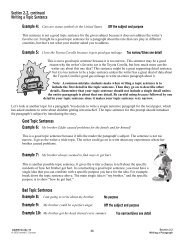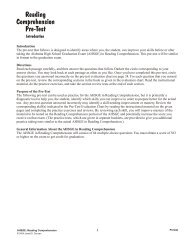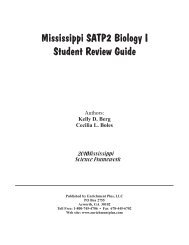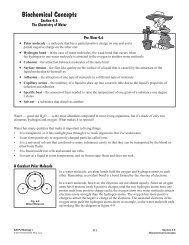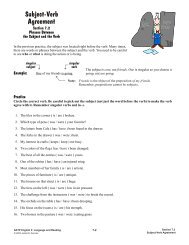Writing/Grammar Pre-Test - Enrichment Plus
Writing/Grammar Pre-Test - Enrichment Plus
Writing/Grammar Pre-Test - Enrichment Plus
Create successful ePaper yourself
Turn your PDF publications into a flip-book with our unique Google optimized e-Paper software.
Section 9.1, continued<br />
Recognizing Mode<br />
Example 1:<br />
On a hot day in August at our favorite spot on the Broad River, the fish<br />
weren’t biting as they usually do, and my brother and I began to fidget<br />
restlessly. After asking our parents for permission, my brother and I quickly<br />
abandoned our fishing poles and scampered our way to an old Indian mound<br />
in search of arrowheads. To our astonishment, we found more than<br />
arrowheads left behind by an ancient civilization. We found ourselves faceto-face<br />
with an apparition that would forever brand our memories.<br />
narrative<br />
This introductory paragraph addresses the prompt and is clearly written in a narrative mode. To address the<br />
prompt, the writer begins to describe an unforgettable childhood memory. The paragraph is narrative because<br />
it describes the setting, a hot day in August at our favorite spot on the Broad River, and it begins to tell a<br />
sequence of events.<br />
Simply writing about childhood or about childhood memories in general would not create a narrative. Look at some<br />
examples that appear to address the topic but are not written in a narrative mode.<br />
Example 2:<br />
Childhood is an important time for all of us to learn new things and<br />
develop our own unique personalities. My own childhood was rich in such<br />
experiences, and I can recall many memories that have shaped who am I<br />
today. These memories document milestones, such as learning to ride a<br />
bicycle and discovering a love for computer games.<br />
not<br />
narrative<br />
By talking about childhood memories in general, this paragraph is not narrative. Notice that it does not tell a<br />
story; it has no setting and no sequence of events.<br />
Example 3:<br />
I will never forget the time I had a parakeet. I named him Teebie and taught<br />
him how to talk. He was so smart that I just left his cage door open so he could<br />
fly out whenever he liked. He would sometimes wake me by pecking me gently<br />
on the lips. He was an amazing bird.<br />
not<br />
narrative<br />
This essay is about a childhood memory of a pet parakeet, but it is not narrative. It is not a story, it does not<br />
have a setting, and it does not tell about an event or a series of events.<br />
Now consider beginning sentences. Can you tell which of these is clearly narrative and which ones are not?<br />
Example 4:<br />
Example 5:<br />
As I watched my best friend ride away with her family in the moving<br />
van, the realization of how different life would be from now on came<br />
crashing into my thoughts.<br />
The day started like any other day, with cereal for breakfast and my<br />
mother’s constant reminders to pack a lunch, but everything changed once the<br />
phone rang.<br />
narrative<br />
narrative<br />
SATP2 English II: W/G<br />
© 2012 <strong>Enrichment</strong> <strong>Plus</strong>, LLC<br />
162<br />
Section 9.1<br />
Characteristics of <strong>Writing</strong>



